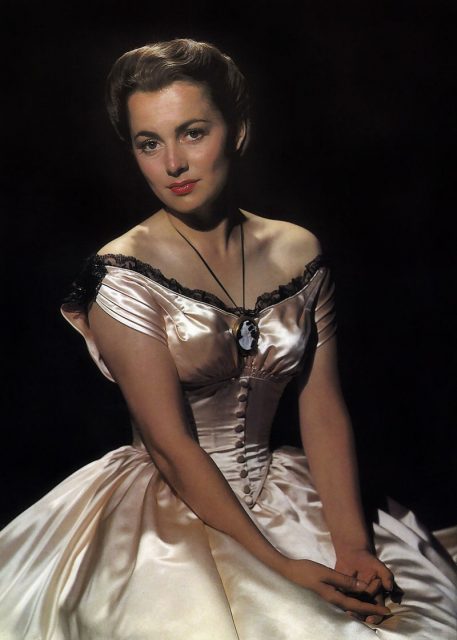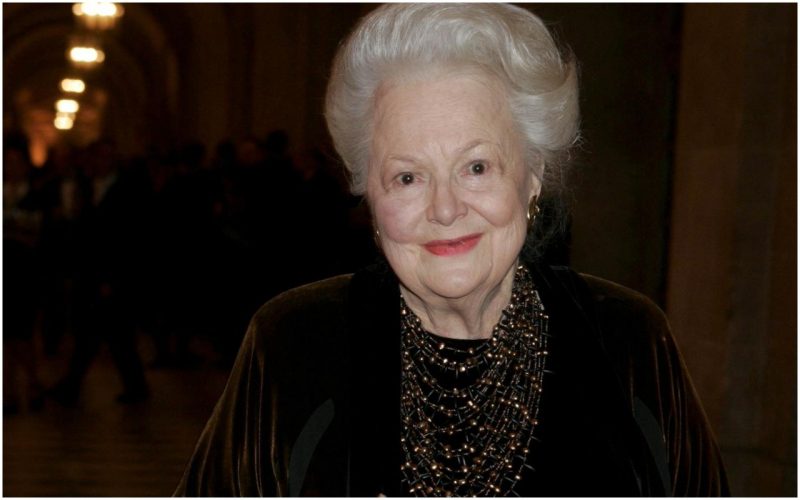Famous people do not always like the way they are portrayed in movies and television series. But one of them, Olivia de Havilland, 101 years old, decided to do something about it. She launched a lawsuit against producer Ryan Murphy and the FX Network over how she was depicted in the FX docudrama Feud: Bette and Joan.
The docudrama focused on the rivalry between Bette Davis, played by Susan Sarandon, and Joan Crawford, played by Jessica Lange, and re-created the high and low points of filming What Ever Happened to Baby Jane? in 1962. The aging stars were shown as bitter and hostile before, during, and after filming the famous horror film.
What outraged Olivia de Havilland, winner of two Academy Awards and perhaps most famous for her role as Melanie in Gone With the Wind, was how Feud cast Catherine Zeta Jones to play de Havilland commenting throughout the series on the feud between the two stars. De Havilland was a confidante of Bette Davis’s, and she replaced Joan Crawford when she dropped out of Hush … Hush, Sweet Charlotte, in which Crawford and Davis were set to repeat their mega-star matchup after the surprise box office success of Baby Jane.

De Havilland’s attorneys said in a released statement: “Miss de Havilland was not asked by FX for permission to use her name and identity and was not compensated for such use. Further, the FX series puts words in the mouth of Miss de Havilland which are inaccurate and contrary to the reputation she has built over an 80-year professional life, specifically refusing to engage in gossip mongering about other actors in order to generate media attention for herself.”
The actress, whose last screen credit was a 1988 television film, asserted that FX portrayed her in “a false light to sensationalize the series” and enhance profits. In one scene, Catherine Zeta-Jones as de Havilland describes her sister, Joan Fontaine, as a “bitch.” (The two sisters lived out their own multiple-decade rivalry, by all accounts.)

De Havilland had a tough case to fight, but she did have the support of the Screen Actors Guild. The New York Times said in a story: “Few expect her to win, but her action is nonetheless reverberating as a kind of last stand against the current bricolage approach to facts.”
De Havilland said in interviews she hated how Feud depicted her: “with a public image of being a lady and a private one as a vulgarity-using gossip… I realize that at this late stage of my life and career I am in a unique position to stand up and speak truth to power—an action that would be very difficult for a young actor to take.”
But the California appeals court ruled in favor of First Amendment rights.
In a unanimous opinion released at the end of March in 2018, the Second District Court of Appeal came down on the side of FX and Murphy, saying they were protected under the First Amendment from de Havilland’s claims that the show cast her in a “false light,” used her likeness without permission, and should have compensated her.

“Whether a person portrayed in one of these expressive works is a world-renowned film star — ‘a living legend’ — or a person no one knows, she or he does not own history,” the three-judge panel wrote in a 38-page opinion. “Nor does she or he have the legal right to control, dictate, approve, disapprove, or veto the creator’s portrayal of actual people.”
First Amendment precedents protects authors who take real-life stories and transform them into fictional works. The judges wrote that Feud was “transformative” — which means it was a creative work that drew from a variety of source material and didn’t derive its value principally from de Havilland’s celebrity.
Ryan Murphy said in his own statement, “The reversal is a victory for the creative community, and the First Amendment. Today’s victory gives all creators the breathing room necessary to continue to tell important historical stories inspired by true events. Most of all, it’s a great day for artistic expression and a reminder of how precious our freedom remains.”
Nancy Bilyeau, the U.S. editor of The Vintage News, has written a trilogy of novels set in the court of Henry VIII: ‘The Crown,’ ‘The Chalice,’ and ‘The Tapestry.’ The books are for sale in the U.S., the U.K., and seven other countries. For more information, go to www.nancybilyeau.com.
